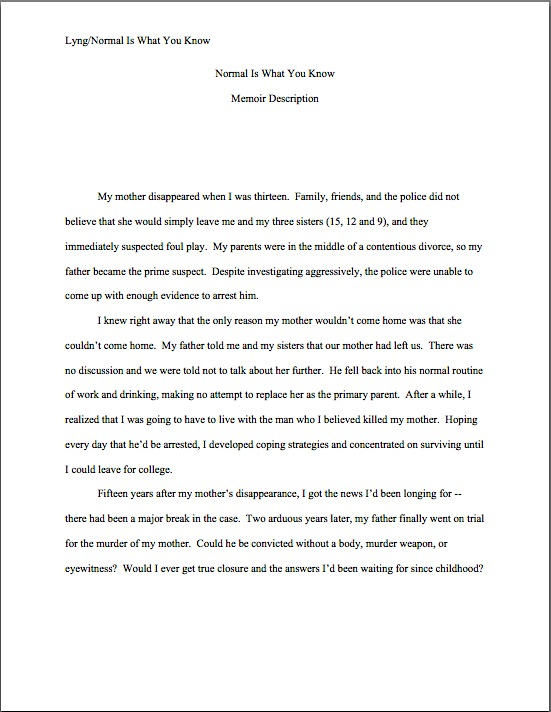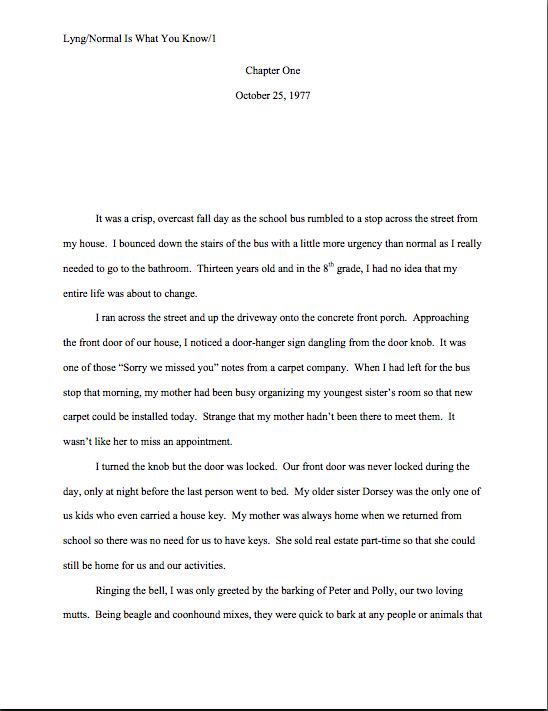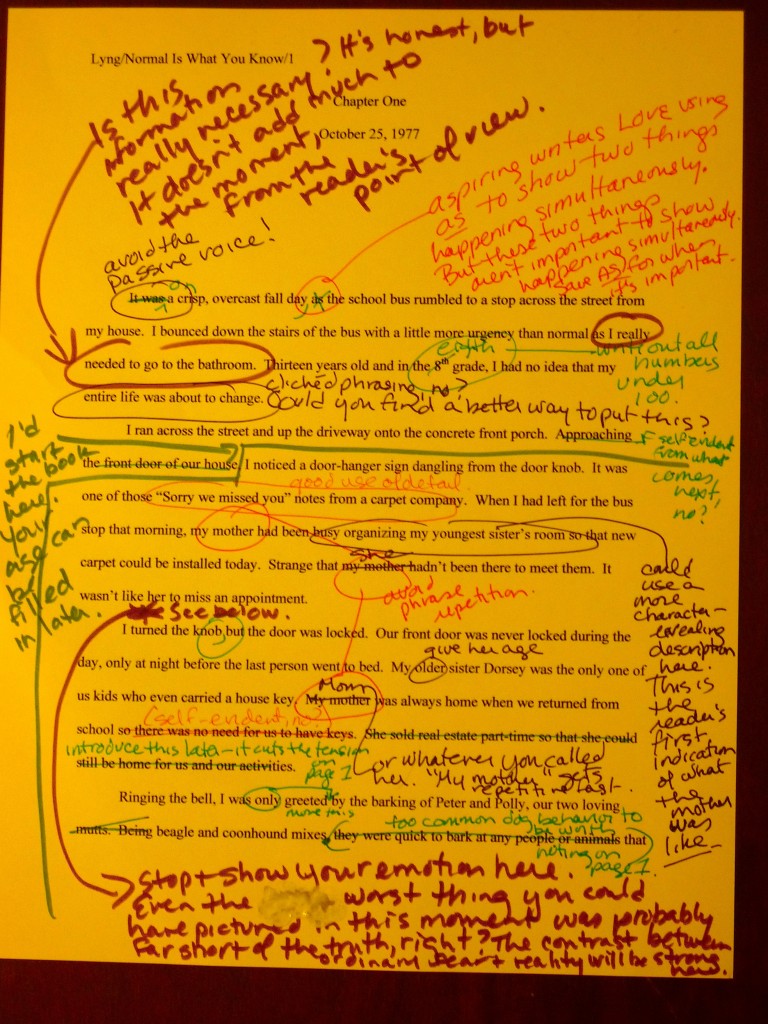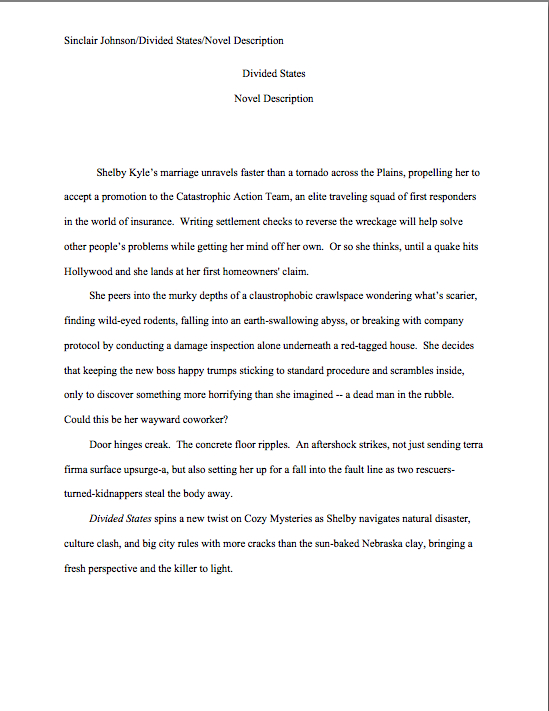
Have everyone’s brains unscrambled after the intensive query-and-submission fest that was Querypalooza? Please enjoy the down time, because next week (Saturday, September 25, to be precise) we shall be hurling ourselves head-first (literally) into Synopsispalooza, a celebration of all things…well, I’m sure you can extrapolate.
In the meantime, I have a real treat in store for you: close Millicent-the-agency-screener-eye-views of some genuinely wonderful reader first pages. That’s right, gang: it’s time once again for yours truly to whip out her multicolored editing pens.
I’m genuinely excited to introduce you to today’s writer, 2010 Author! Author! Award for Expressive Excellence winner Cole Casperson, pictured above. Like the three other A!A!AEE winners this year, Cole also won the Grand Prize in the Author! Author! Great First Page Made Even Better Contest last June. To render that dual win even more impressive, the first page of INDOMITVS garnered a distinction that no other entry did: the judges agreed that it was a contender for top honors in two categories: Adult Fiction (the category in which it was actually entered) and YA.
How is that possible? Well, for the reason that the judges were unanimous in their eagerness to see me evaluate this entry in a blog post: the voice and plot would have worked for either.
Don’t keep parroting, “How is that possible?” I’m about to let you see for yourself — and please, if the type is too small or too fuzzy on your screen, do yourself a favor and enlarge the image by holding down the COMMAND key and pressing + a couple of times. You’re going to want to say in future that you were among the first to read this promising new voice.
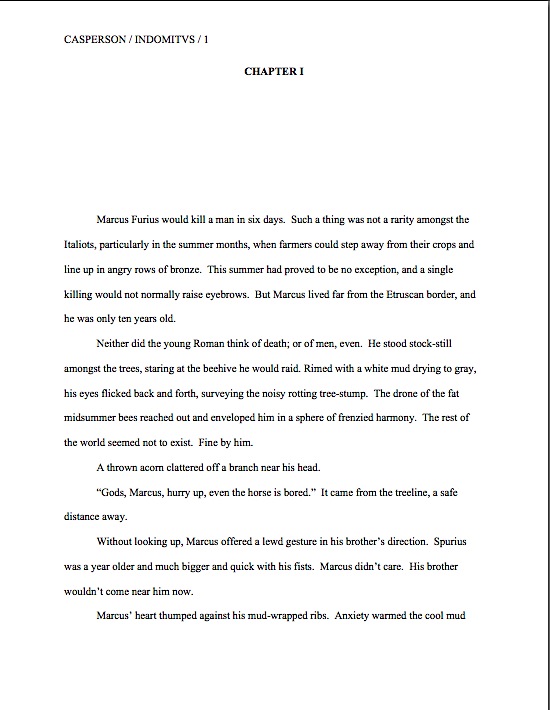
Compelling, isn’t it? By the bottom of the page, it’s easy to care about these characters; we already are inhabiting their lifeworld.
That’s not easy to do in that few lines, obviously. So what’s the secret? All of those gorgeous specific details, combined with that lovely narrative rhythm: when farmers could step away from their crops and line up in angry rows of bronze…surveying the noisy rotting tree-stump…the drone of the fat midsummer bees reached out and enveloped him in a sphere of frenzied harmony.
That’s some nice writing, eh? Especially coming hard on the heels of a genuinely terrific first line that both flings the reader directly into our hero’s mindset and sets the time period: Marcus Furius would kill a man in six days.
Cole’s brief description in his contest entry also makes the book sound like a heck of a lot of fun:
No novel has focused on a nascent Rome’s most exciting period: the Early Republic. Rome had to start somewhere, and I write about the man responsible, Camillus. In a market where Anakin Skywalker is a kid and Batman Begins, why not explore the prequel to Caesar, Spartacus, Cleopatra, etc?
About half of the judges drew in their breath sharply at that surely exaggerated first sentence: there have most assuredly been novels set in that time period before, a few of them recent releases. And that could be very problematic at query time, because if Millicent happened to work at an agency that had represented such a novel within the last decade (or even if she had read one during that period), she would be likely to mutter under her breath, “Well, this one didn’t do his market research,” and reject the query.
So why, given how negatively Millicents as a group tend to respond to all-or-nothing statements in descriptive paragraphs, did I, alone amongst the judges, cry, “Hooray!” when I spotted this description amongst the winning contest entries?
Quite simply, I knew it would make a terrific example. Those of you who followed my recent Querypalooza series might already have guessed why: queriers and pitchers make this sort of black-and-white claim all the time.
In fact, nearly every entrant in this particular contest included one or more overstatement in her book description — not all that astonishing, given how often such statements turn up in queries. Mistakenly, many queriers seem to believe that the use of superlatives will make their claims to originality, writing quality, and/or marketability stronger and more convincing. But like any other claim made in a query letter, Millicent is unlikely to believe it unless the querier provides some evidence. It is always better to show her that your book is original, well-written, and/or marketable than just to assert it.
To be fair, this description may not have been written for inclusion in a query letter: the contest rules did specify that the descriptive paragraph should explain what is original about the manuscript in question. What, we asked, will this book add to its chosen book category?
Cole’s description satisfies that brief rather well. But I ask you: based on this first page alone, what is the book category, and who is the target audience?
Not immediately obvious, is it?
That’s why, in case you’d been wondering, the judges were split about placing this in the Adult Fiction or YA category: the voice, the vocabulary, and the story so far could in fact place it in either, right? Yet being judges, they were in a position to do what a perplexed Millicent scanning a writing sample in a query packet might not necessarily do — ask the writer to produce, as all of the winners and placers were asked to do, a page-length book description.
Take a gander at INDOMITVS’ longer description. Fair warning: I shall be asking you to consider the question of book category again afterward.
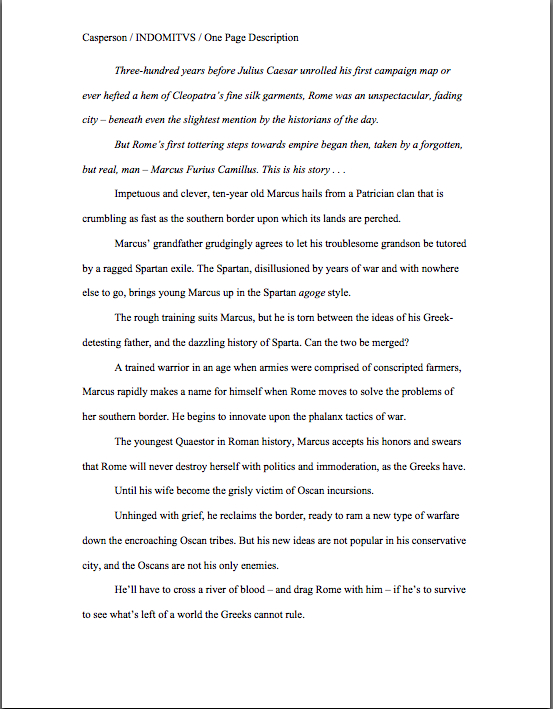
If you said, “Why, this sounds like historical fiction,” give yourself a gold star for the day. Cole did indeed enter this first page and the description above as historical fiction.
If I know the quick eyes of my hardcore readership, however, a forest of hands was already in the air by the end of the first sentence. “But Anne,” those of you who have followed past discussions of both standard format and Millicent’s pet peeves point out, “wouldn’t some Millicents — or, indeed, many contest judges — not have read this description in its entirety? It’s not in standard format, as I understood that everything that went into a query packet should be, and I thought that it was fairly normal for professional readers simply to skip over openings in italics. So wouldn’t today’s winner be much more likely to make friends and influence people in agencies if he made these relatively small cosmetic changes?”
Why, yes, clever and incisive long-time readers, he almost certainly would. However, it’s a pretty good back jacket blurb, isn’t it? For the purposes of this contest, that’s perfectly okay, italics and all. (It would also make quite a good verbal pitch as is, come to think of it.)
Which is not to say that it couldn’t be improved — or would fly as a 1-page synopsis in a query or submission packet. One of the things I love about this particular contest: in awarding the prizes, I have a genuine opportunity not only to give my readers fine examples of how to do a first page right, but also to help our winners make — wait for it — their great first pages even better.
In that spirit, I’m going to go ahead and give some tips on improving this description, just in case our winner should ever like to tuck it into a query envelope. I also suspect that this feedback might be helpful to anyone out there querying an agency that expects a 1-page synopsis to be tucked into the query packet.
Okay: let’s start with expectations: everything, but everything, that an aspiring writer sends to an agency is a writing sample, and should be treated accordingly. Proofread closely, under the assumption that Millicent will probably turn green at even a single typo; adhere to the strictest standards of grammar and style, on the same principle; use standard format in promotional materials (as opposed to the query letter itself), assuming that Millicent is used to seeing writing samples formatted that way. (And if you weren’t aware that manuscripts and books are not supposed to look alike, run, don’t walk, to the HOW TO FORMAT A MANUSCRIPT category on the archive list at right before you even consider mailing any pages at all to an agency.)
Would something as simple as a typo or a non-doubled dash in a synopsis be enough to trigger rejection? Not always, but remember, a querier or submitter can have absolutely no idea what has just happened immediately before Millicent opens his packet. For all you know, Millie’s boss might just have finished a tirade on how e-mail and social media have caused the general standards of spelling and grammar to decline, or just yelled at a client for a formatting gaffe.
Yes, both happen. Make sure your materials — all of them — are impeccable.
Then, too, as we saw throughout the summer and in the post on our last winning entry, professional readers are HARSH. Even more so on writing they like than writing they don’t, typically: close scrutiny is the compliment the pros pay writing that they consider publishable; no writer in her right mind would actually want her book to go to press with lingering typos or logic problems, right?
So in not pulling their punches, they honestly believe they are being helpful. Spotting a manuscript’s weaknesses is often a matter of experience, pure and simple. Agents and editors don’t read like everyone else, and neither do good freelance editors. Our eyes are trained to jump on problems like…well, insert any predator-prey analogy you like here.
The point is, we’re fast, and our aim is deadly. And when Millicent grows up, she wants to be just like us.
I am reminded of M.F.K. Fisher’s wonderful anecdote about being solicited by her neighbors to write a preface for a charity cookbook — you know, one of those collections of recipes that were so popular as fundraisers in the 1970s, in which well-to-do local matron share the secrets behind their potluck-famous pineapple upside-down cakes and tuna surprise. The cookbook’s editors, both volunteers, came knocking on Fisher’s door in the hope that having a big-name food writer attached to their compilation of local recipes would make the book sell better. It was, they told her, for a good cause, so she donated her expertise.
Well (the story goes), Fisher genuinely wanted to help them, so she very kindly took the draft book from them and had a good, hard, professional look through the patched-together manuscript. Without missing a beat, she instantly began barking out everything that was wrong with the book: poor editing, meandering writing, abundant redundancies.
All of the things, in short, that professional readers would automatically flag in a manuscript.
When she paused for breath, she noticed that the amateur editors were not gratefully taking notes. Instead, they were dissolved in tears. From their non-professional standpoint, Fisher had been hugely, gratuitously, deliberately mean, whereas from a professional point of view, she had been paying them the huge (and possibly undeserved) compliment of taking their project seriously.
Yes, yes, I know: by this logic, the person eaten by a lion should be flattered by the lion’s impression that he tastes good. But as I have mentioned before, I don’t make the rules; I just tell you about ‘em.
The fact is, from a professional perspective, whitewashing an editorial opinion about a manuscript is a waste of everyone’s time. In a freelance editor’s feedback, it would border on unethical.
For those of you who think that this mindset sounds like a pretty fine reason to steer clear of anyone who might be tempted or empowered to pay this particular stripe of compliment, let me hasten to add: the ability to take criticism well is a highly valuable professional skill for writers; in the long run, you will be much, much happier if you start developing it as part of your tool kit before you start working with an agent or editor.
Your dream agent, I assure you, will just assume that you have already have it up your sleeve. This is precisely why your dream agent should not be the first human being other than your spouse, best friend, or mother to set eyes on your manuscript.
All of which is to say: I am cruel here only to be kind. Here is how Millicent would see the book description above.
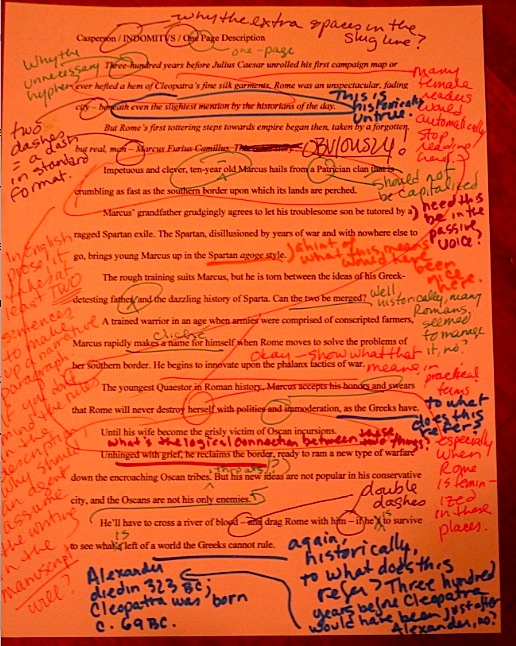
Startling, isn’t it? At the risk of repeating myself: every syllable an aspiring writer allows to pass under Millicent’s scrutiny is a writing sample. It’s in your best interest to assume an uncharitable reader, rather than — as most queriers and submitters assume — one that will be predisposed to overlook small faux pass in a manuscript that shows real promise.
As this one most assuredly does, by the way. But that doesn’t mean that even a Millicent who fell in love with the strong narrative voice, the interesting and unexpected protagonist, and/or the unusual story would not respond to that first page we all admired so much like this:
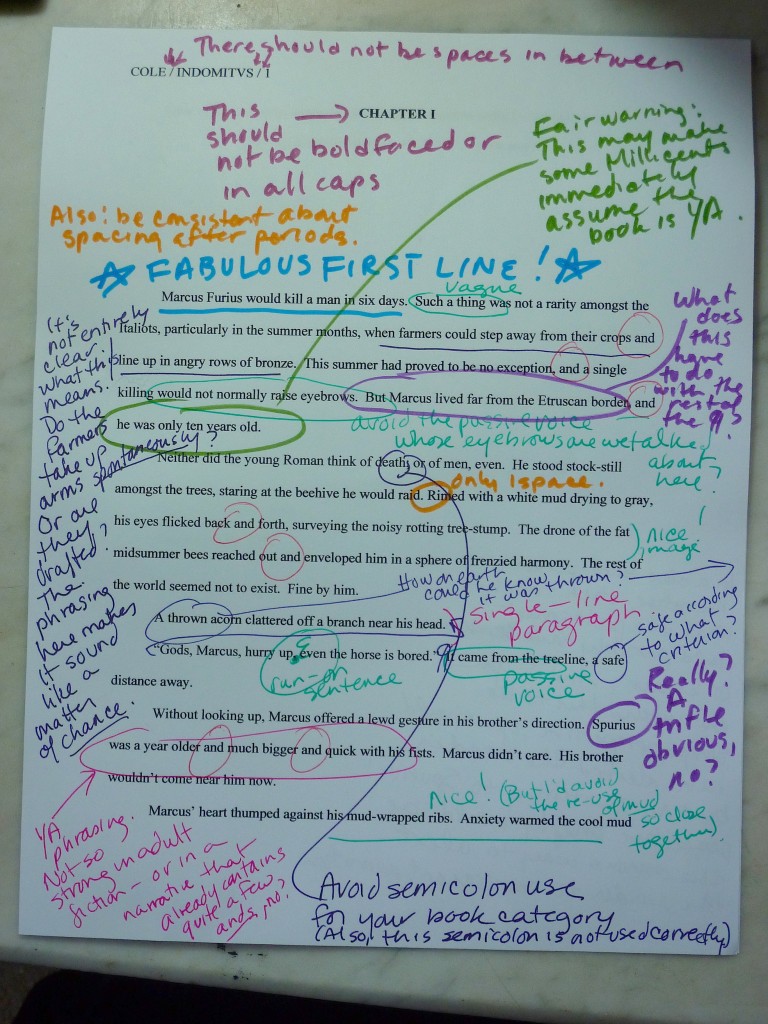
And yes, in response to what a good two-thirds of you just thought: this is how a professional reader reacts to a first page she likes. I didn’t spend all summer yammering about first page troubleshooting just because I happen to like book openings, after all.
The good news is that not only are all of the problems here easily fixable; they are easily fixable in under an hour. Certainly a worthwhile investment in improving an opening as compelling as this one’s agent-seeking chances, eh?
Let’s begin with the formatting problems, starting at the very top of the page. Those of us who read manuscripts for a living have been complaining for the last year and a half or so that all of a sudden, we’ve been seeing slug lines — that author-identifying bit at the top of each and every page of a professionally-formatted manuscript — with extra spaces in them, a relative rarity before. Abruptly, aspiring writers were showing up with this:
CASPERSON / INDOMITVS / 1
Rather than this:
CASPERSON/INDOMITVS/1
Or, even more properly — and effectively, given this particular title — this:
Casperson/INDOMITVS/1
The extra spaces on either side of the dashes may look cool to aspiring writers, but to anyone who stares at professionally-formatted manuscripts day in and day out, they will just look wrong. Ditto with the all-caps chapter title seen here:
CHAPTER 1
To writer, this capitalization choice may seem like purely a matter of personal style, but to Millicent, it’s a matter of formatting. In a manuscript, chapter designations are in title case:
Chapter 1
Or, if you prefer:
Chapter One
Several other issues might have been less obvious to the eye unaccustomed to the rigors of standard format, but to a professional reader, they would leap off the page. First, the page is not consistent about having two spaces or one after a period. As we’ve discussed in the past, there is actually some debate amongst agents on this subject, so ALWAYS check agency guidelines before you submit: two spaces is the standard format default, but if an agent has a strong preference for one, for heaven’s sake, give it to her.
Whichever you choose, though, be consistent. Professional readers are specifically trained to catch inconsistencies.
Another problem that would have caught Millicent’s eye is the run-on sentence in line -6:
“Gods, Marcus, hurry up, even the horse is bored.”
There is no real narrative benefit to running two sentences together here, which renders this rule-break a risk without a clear pay-off. While run-on sentences have become much more acceptable in dialogue in recent years than in the Thou Shalt Not decades of the 20th century, they are still grammatically incorrect. It should read:
“Gods, Marcus, hurry up. Even the horse is bored.”
Another often-overlooked rule — or, indeed, one of which many aspiring writers do not seem even to be aware — is the single-sentence narrative paragraph. Here, we see it in line -7:
A thrown acorn clattered off a branch near his head.
Now, there is nothing wrong with that sentence per se. (Although a Point-of-View Nazi might be tempted to ask how precisely, given that the narrative appears to be in the tight third person for the rest of the page, the protagonist could possibly have told the difference between an acorn that was thrown and one that simply fell on him. One suspects that the trajectory might have provided the necessary clue, but the narrative does not discuss it.) Standing alone in its own paragraph, however, it would jar a professional fiction reader: outside of dialogue, a proper narrative paragraph consists of at least TWO sentences.
I specified a fiction-reading pro, because these days, pretty much all U.S. newspaper and magazine writing abounds in single-sentence paragraphs. And, of course, the entire opus of Joan Didion, who popularized the single-line paragraph. Yet more evidence that aspiring writers are held to a significantly higher literary standard than famous ones — and that the AP style embraced by newspapers is not identical to the expectations for book manuscripts.
As Cole is obviously aware, there’s quite a bit of fiction out there right now that breaks this rule. However, the generally-accepted rule of thumb is that the rule should be broken ONLY for emphasis. Like, for instance, when the information divulged in that single line is in some way a surprise. For example, while this would be technically correct:
Jean-Paul scratched his head, perplexed. Now that he had removed the hinges, the door should have been possible to open, but it would not budge. Had it been barricaded from the other side? Before he had even finished formulating the question, the wood splintered, and a hefty green hand reached through the aperture to grasp him by the throat.
A writer might conceivably want to underscore the twist by setting the final sentence off by itself:
Jean-Paul scratched his head, perplexed. Now that he had removed the hinges, the door should have been possible to open, but it would not budge. Had it been barricaded from the other side?
Before he had even finished formulating the question, the wood splintered, and a hefty green hand reached through the aperture to grasp him by the throat.
Reads surprisingly differently, doesn’t it? Yet like any narrative device, the single-sentence paragraph loses its power if used too often. Reserve the single-sentence sentence for when the information is genuinely startling, to set it off from the rest of the text.
As I said, though, all of these problems are easily and practically instantly fixable, the type of things that could have been caught right away by a talented proofreader. There is one danger, however, that a non-professional reader would have been extremely unlikely to catch.
Unfortunately, it is also something that could result in instant (and, I think, entirely undeserved) rejection at many agencies. Care to guess what might press Millicent’s buttons?
No? Let me give you a hint: it is integrally related to the judges’ primary concern about this first page.
If you have been jumping up and down for the last two paragraphs, waving your arms and screaming, “I know, Anne! Millicent is likely to cast her eyes over this page, say, ‘Wait, this is YA; my boss doesn’t represent that. Next!’” take 14 gold stars out of petty cash. This is, believe it or not, the single most likely reason that this first page might be rejected.
Yes, really. If a story opens with a pre-voting age protagonist, many a Millicent at an adult fiction-representing agency has been known to leap to the conclusion that the writer has miscategorized a YA book or (and this is, alas, the more likely surmise if this page comes in a query packet) that the writer just didn’t bother to check whether the agency represents YA or not. Since no query or submission is easier to reject than one in a category Millicent’s boss does not sell, either of these situations would be no-brainer rejections.
Oh, I can tell from here that a lot of you hate that. “But Anne,” writers of stories that begin in the protagonist’s youth and follow him through time protest, “that isn’t fair. If Millicent is confused about the book category, why wouldn’t she just go back and check the query letter or synopsis? Heck, in a submission, she could just check the title page; the book category would be in the upper right-hand corner.”
Good question, linear time-lovers, but I suspect that you won’t like the answer much: because she has a lot of first pages to read today, and her job is to reject 98% of them.
So how can a savvy writer protect her manuscript from this ugly fate? Well, I’m afraid my solution is pretty cynical: even if the book follows the protagonist throughout a lifetime, consider opening the submission version of the manuscript with a scene from her adult life, then jump backward in time.
Hey, you can always cut that opening scene prior to publication, right? Your goal here is to get past Millicent.
A less cynical approach, and one that might work better for Cole’s page, would be to rid the page of any elements other than the protagonist’s age that could be giving off a YA vibe. In this first page, there are several. The use of the historical future in the first sentence, for instance: while historians and other nonfiction writers are fond of this tense (so dramatic!), in fiction, it’s most closely associated with fairy tales (unbeknownst to Hansel and Gretel, that gingerbread house was to be their downfall). In most adult fiction, even if the overall plot is not told in chronological order, the action in an individual scene usually is.
Or, to pony up an old favorite from last summer, the percussive use of and:
Such a thing was not a rarity amongst the Italiots, particularly in the summer months, when farmers could step away from their crops AND line up in angry rows of bronze. This summer had proved to be no exception, AND a single killing would not normally raise eyebrows. But Marcus lived far from the Etruscan border, AND he was only ten years old.
Or, still more YA-like, its repetitive use within a single sentence, to echo a common pattern in childish speech:
Spurius was a year older AND much bigger AND quick with his fists.
While a 10-year-old might legitimately think like this, here, in a narrative that otherwise has an adult tone –heck, it even sports a semicolon in line 6 — it seems to convey an expectation about the audience, as well as information about the protagonist. This structure — technically a run-on — is far more common in YA than in most adult fiction categories. It’s also much more frequently used in first-person narratives (particularly YA first-person narratives), in order to give a (false) impression of a chatty, conversational tone.
The final element that might lead Millicent — and did lead half of the judges — to conclude that the story to follow was YA lies in the name choices. You must admit in any ahistorical novel, featuring a protagonist who apparently has the last name Furius would constitute a bit of a character development give-away: you’d hardly be surprised if this guy turned out to be a trifle on the impatient side, would you?
True, we know from the blurb that this book is about someone who really lived, so his name would not be easy to change. What is completely under the writer’s control, however, is what the character is called in the narrative — and certainly what he is called in the first line of the book. Remember, readers’ first impressions are formed very quickly.
But Marcus’ name isn’t really the part that screams YA here. His brother, a winning tyke apparently named Spurius Furius, does.
Actually, in real life, the guy’s name was Spurius Camillus — our protagonist was, as we know from the book description, Marcus Furius Camillus — but that’s not the point. It would be hard to make a name like this to work on page 1, unless the voice was clearly comedic beginning in the first paragraph.
And don’t suggest that a reader has an obligation to read the back jacket blurb before starting page 1. Even in a published novel, that would be a dangerous presumption; at the query and submission stages, an assumption that Millicent would already know historical characters’ actual names could be fatal.
How so? Well, go back and re-read page 1: is there anything there to indicate that Furius isn’t the boys’ last name? And since a reader of adult fiction must be presumed to be familiar with the term spurious, why wouldn’t Millicent leap to the conclusion that the brother’s name was a joke intended to fly slightly over young readers’ heads, an inducement to beef up their vocabularies, especially in a manuscript where the protagonist is (at least at first) ten years old?
So how should Cole rectify this problem, given that he can’t exactly rechristen people who lived over 2,000 years ago? At the risk of seeming cynical…well, you know what I was about to suggest. Or — and this was what a good half of the judges thought he should do — he could turn the book into YA.
Those are calls that only he can make, of course. Everybody here at Author! Author! is awfully darned excited to see what he decides; the judges were unanimous that they want to be told well in advance when this book is going to be available for sale, so they may pre-order it.
If the rest of you take nothing away from this post, let it be this: even a wonderful first page can almost always be improved. A grabber of a hook, nicely-written sentences, engaging characters, a sense of place — all of these Cole’s opener has in spades. But as a professional reader, that only renders me more excited to read the revised version to come.
Congratulations, Cole — this really does sound like one heck of a book. Keep up the good work!

